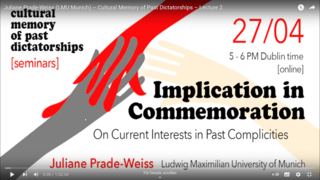Forschungsprojekte
Discourses of Mass Violence in Comparative Perspective
The project links the fields of Contemporary History, Comparative Literature, and Hebrew Bible/ancient Near East studies to understand the transmission of discourses which justify mass violence across, generations, epochs, languages, and cultures.
project homepage: www.lmu.de/discoursesofmassviolence
project partners: Dominik Markl (Rome), Vladimir Petrovic (Belgrade/Budapest)
Complicity: A Crisis of Participation
in Testimonies of Totalitarianism in Contemporary Literatures
Complicity is a subject of fascination in popular fiction and, at the same time, an eminent challenge to the democratic maxim of participation and in the role of the individual as responsible actor in political, economic, and ethical communities. Complicity is conventionally used as a legal term to describe the way a crime is committed, namely by aiding or abiding wrongdoing. A broader notion of complicity as being involved in complex structures has become a common feature in critical and public discourse, mostly in the claim that remaining inactive or continuing a certain habit renders the subject complicit in wrongdoings of humanitarian, political, ecological, moral, or other natures. While pervasive structures of complicity without explicit consent indeed pose the question of what participation and individual responsibility means in a world of globalized markets, conflicts, climate change, and electronic media, the criticism of complicity raises the same question: Is there a point of view that is not involved in any social contexts? How would such a position communicate, given that languages rely on the participation in pre-determined structures of grammar, semantics, etc.? In how far is the assumption that the positions of analysis, critique, and opposition can be untouched of all wrongdoing itself an instance of complicity by ignoring the complexity of involvements?
The interdisciplinary project relates recent research in law and social sciences to testimonies of totalitarianism in contemporary literatures, particularly from Central and Eastern Europe. Objective of the project is a deeper insight into how complicity enfolds: First, the project reads literary texts as genuine contributions to a general understanding of complicity that expound the comprehensive role of language in structures of participation and involvement. In portraying conflict and wrongdoing, literature relies on the complicity of the audience, be it the imagination of the reader, or the gaze of the spectator. Second, the project employs insights of legal and social sciences research to highlight complicity as a pressing concern in contemporary German-language literary testimonies of totalitarianism that have, so far, been interpreted mostly with regard to memory culture, trauma, and (transnational) identity discourses. The concern of these texts, however, is just as much for the present as they outline modes of partaking in institutional violence that draws on heritage, culture, gender, social, and other distinctions. The modes of complicity stand out more clearly – and are acknowledged more readily – in dictatorships of the past. They are more complicated, but just as active, in the globalized world of the present. The outlook onto the broader academic discussion and current societal problems strengthens the stance of humanities research by demonstrating its relevance to citizens at large.
The manifest crisis in European integration, and the backlashes onto democratic freedom by what appear to be resentments and beliefs from a violent past, make it urgently necessary to address those structures of public discourses and institutions that – even if unwillingly and unknowingly – foster rather than oppose antidemocratic, totalitarian notions.
Project portray in the European Union CORDIS-repository:
https://cordis.europa.eu/article/id/435572-textual-analysis-reveals-how-complicity-enfolds
This project is represented in the DFG scientific network "Complicity: Enfoldings and Unfoldings", headed by Prof. Dr. Cornelia Wächter, English literature, TU Dresden.
Keynote Implication in Commemoration: On Current Interests in Past Complicities
Conference "Cultural Memory of Past Dictatorships: Narratives of Implication in a Global Perspective"
University College Cork, 27 April 2022
Pandemic Grief:
COVID-19, Communal Loss, and Emotive Responses to the Global Ecological Crisis
Situated at the intersection of ecocriticism, trauma/resilience studies, medical humanities, and the planetary health approach, the project links literary and cultural studies, media studies, theatre studies, philosophy, theology, and psychology to inquire into how pandemic grief and communal loss elicited by the SARS-CoV-2 outbreak can be addressed in view of its underpinnings in the ecological crisis. The pandemic and the ecological crisis are global phenomena, pertain to all areas of life, and call for an international, interdisciplinary approach. The project’s fundamental hypothesis is that the SARS-CoV-2 pandemic globalizes the loss of familiar customs and forms of life brought about by the ecological crisis, spreading communal grief that needs to be addressed.
The project has two objectives: First, the project reads media, public, and expert responses to the SARS-CoV-2 pandemic as verbal practices that rely on established patterns of discourse. These readings refer to negotiations of crisis and loss in the literary canon, scriptural and philosophical tradition, aesthetic and psychoanalytic theory. Emphasizing affectability as fundamental human condition, the project is based on the rationale that the pandemic and its underpinnings in the ecological crisis call for adaption rather than resistance, and that the hermeneutical tradition linking different humanities fields provides a robust model for adaption: for transferring testimonies of past experience to unprecedented purposes. Second, the project employs the global experience of disruption in the SARS-CoV-2 pandemic as hermeneutical key to the ecological crisis which exceeds conventional terms of comprehension. That the extent of climate change and complexity of ecosystems defies understanding has been described as temporal and spacial scaling effect. The project outlines relationality as a third aspect limiting comprehension and effective reaction to the ecological crisis: seeing, feeling, and believing oneself and others affected by processes that are, for the most part, accessible only via complex scientific models.

